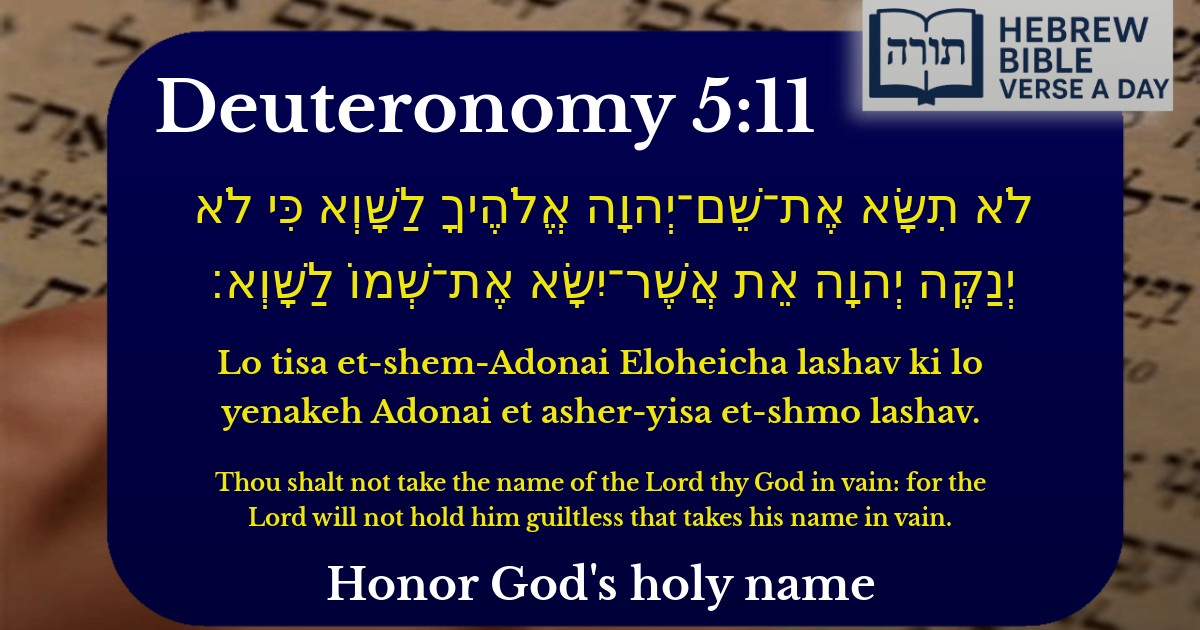Join Our Newsletter To Be Informed When New Videos Are Posted
Join the thousands of fellow Studends who rely on our videos to learn how to read the bible in Hebrew for free!
Hebrew Text
לֹא תִשָּׂא אֶת־שֵׁם־יְהוָה אֱלֹהֶיךָ לַשָּׁוְא כִּי לֹא יְנַקֶּה יְהוָה אֵת אֲשֶׁר־יִשָּׂא אֶת־שְׁמוֹ לַשָּׁוְא׃
English Translation
Thou shalt not take the name of the Lord thy God in vain: for the Lord will not hold him guiltless that takes his name in vain.
Transliteration
Lo tisa et-shem-Adonai Eloheicha lashav ki lo yenakeh Adonai et asher-yisa et-shmo lashav.
Hebrew Leining Text
לֹ֥א תִשָּׂ֛א אֶת־שֵֽׁם־יְהֹוָ֥ה אֱלֹהֶ֖יךָ לַשָּׁ֑וְא כִּ֣י לֹ֤א יְנַקֶּה֙ יְהֹוָ֔ה אֵ֛ת אֲשֶׁר־יִשָּׂ֥א אֶת־שְׁמ֖וֹ לַשָּֽׁוְא׃ {ס}
Parasha Commentary
📚 Talmud Citations
This verse is quoted in the Talmud.
📖 Shevuot 21a
The verse is discussed in the context of oaths and the prohibition against taking God's name in vain, particularly focusing on the severity of false oaths.
📖 Sanhedrin 56a
The verse is referenced in the discussion of the Noahide laws, where it is considered one of the commandments given to all humanity.
📖 Temurah 3b
The verse is cited in a discussion about the sanctity of God's name and the consequences of misusing it.


The Prohibition Against Taking Hashem's Name in Vain
The verse (Exodus 20:7) prohibits taking the name of Hashem in vain, which is understood by Orthodox Jewish tradition as a serious transgression with far-reaching implications. Rashi explains that this refers to swearing falsely or unnecessarily using Hashem's name in an oath, even if the statement itself is true. The Rambam (Hilchot Shevuot 1:4-6) elaborates that this includes any oath that is meaningless, false, or made about something already known.
Three Categories of the Prohibition
Severity of the Transgression
The verse concludes with a stern warning: "for the Lord will not hold him guiltless that takes His name in vain." The Talmud (Shevuot 39a) teaches that this sin is so severe that even repentance and Yom Kippur do not fully atone for it—only suffering completes the atonement. The Midrash (Sifrei Devarim 61) compares it to denying Hashem's existence, as it misrepresents His holiness.
Practical Halachic Implications
Halacha (Shulchan Aruch, Orach Chaim 215) strictly regulates when and how divine names may be uttered, particularly in blessings or Torah study. One must avoid:
Spiritual and Ethical Lessons
The Sefer HaChinuch (Mitzvah 30) explains that this mitzvah trains us to recognize the sanctity of speech and the gravity of invoking Hashem's name. By guarding our words, we cultivate yirat Shamayim (fear of Heaven) and ensure that divine language remains sacred. The Chofetz Chaim (in Shemirat HaLashon) extends this principle to all speech, teaching that careless words—even without divine names—can violate the spirit of this commandment by eroding spiritual sensitivity.